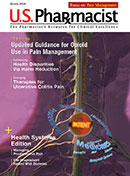Rotterdam, The Netherlands—Which type of beta-blockers are prescribed to older patients can have a significant effect on their risks of falling, a new analysis suggests.
An article published in the British Journal of Clinical Pharmacology reports that patients using nonselective beta-blockers could be at an increased of falling compared with those using selective beta-blockers.
University Medical Centre Rotterdam–led researchers note that the drugs differ by their receptor-binding properties and their systemic effects on the body.
The study team analyzed data from two prospective studies involving more than 10,000 individuals. Those prospective studies included 7,662 community-dwelling individuals (the Rotterdam Study) and 2,407 adults aged more than 55 years (B-PROOF).
Results indicate that use of a selective beta-blocker was not associated with fall risk, but use of a nonselective beta-blocker was associated with a 22% increased risk. Overall, 2,917 participants encountered a fall during follow-up, study authors point out.
Meta-analysis indicated no association between use of any beta-blocker, compared to nonuse, and fall risk, for a hazard ratio of 0.97. It also didn’t link falling with taking a selective beta-blocker, for an HR of 0.92.
The hazard ratio of taking a nonselective beta-blocker, however, was 1.22. Other beta-blocker characteristics such as lipid solubility and CYP2D6 enzyme metabolism were not associated with fall risk, researchers note.
“In clinical practice, beta-blockers have been shown effective for a variety of cardiovascular indications,” study authors write. “Though, fall risk should be considered when prescribing a beta-blocker in this age group, and the pros and cons for beta-blockers classes should be taken into consideration.”
“Drug-related falls remain under-recognized, leading to preventable falls and related injury,” added senior author Nathalie van der Velde, MD, PhD. “Precise prediction of drug-related fall risk is of major importance for clinical decision-making. Knowledge of type-specific effects such as selectivity in beta-blockers can be expected to improve decision-making.”
« Click here to return to Weekly News Update.





